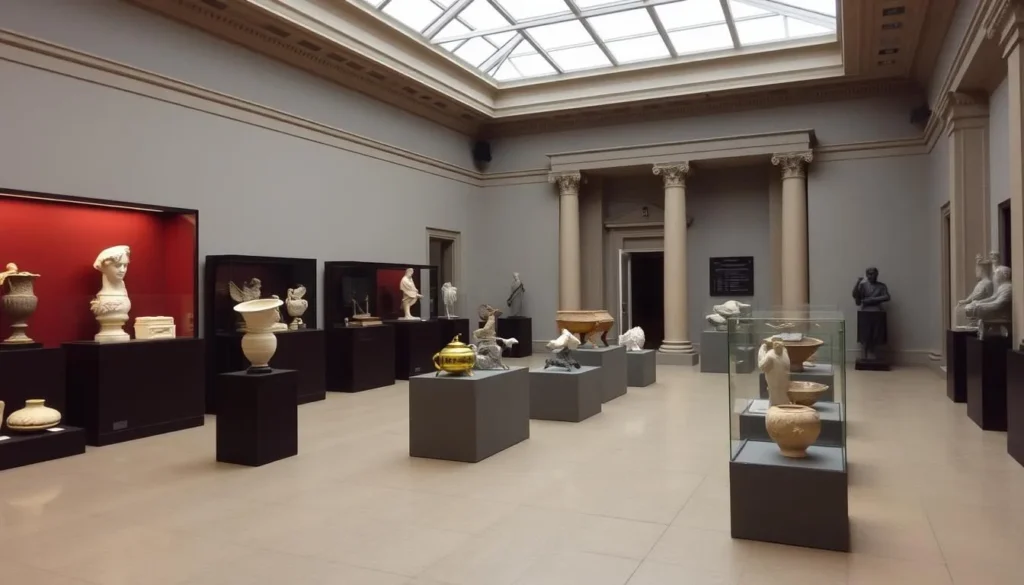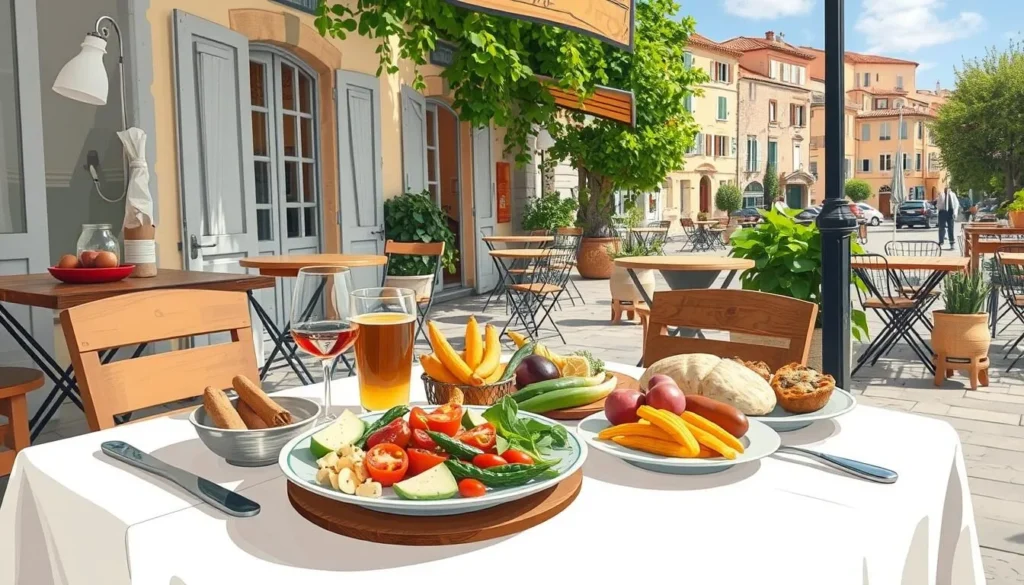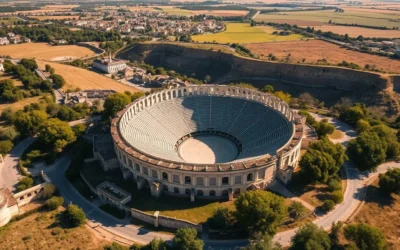✓ Accommodations✓ Flights✓ Rental Cars✓ Tours & Activities
Imagine strolling through a city that’s steeped in history and architectural grandeur. Nîmes, often referred to as “the Rome of France,” is a treasure trove of Roman monuments and cultural attractions that will transport you back in time.
As you explore this charming place, you’ll discover an array of things to see and do, from ancient amphitheaters to beautiful gardens. Whether you’re a history buff or simply looking for a unique travel experience, Nîmes has something for everyone.
This guide will walk you through the top attractions and experiences that make Nîmes a must-visit destination in southern France.
Discovering the Rome of France
As you step into Nîmes, you’re not just walking into a city; you’re stepping back in time to the era of Roman grandeur. With a history that spans over two millennia, Nîmes is a place where ancient ruins stand testament to its glorious past.

A Brief History of Nîmes
Nîmes was founded by a Celtic tribe in the 6th century B.C., a time when the region was already bustling with activity. Later, it became one of Rome’s most important colonies, thanks to its strategic location on the Via Domitia, the first Roman road that connected Italy to Spain. This city‘s prosperity was largely due to its position as a major crossroads, facilitating trade and cultural exchange.
Under Emperor Augustus in the 1st century B.C., Nîmes was transformed into a thriving Roman colony. Many of the monuments built during this period still exist today, making Nîmes a unique place to experience Roman history firsthand. The city’s symbol, a crocodile chained to a palm tree, represents its victory over Egypt and is a testament to its rich cultural heritage.
Why Nîmes Deserves a Spot on Your French Itinerary
Nîmes is often referred to as the “Rome of France” due to its exceptionally preserved Roman architecture. Unlike more famous French cityes like Paris or Lyon, Nîmes offers a distinct perspective on French history, with its Roman ruins being some of the best-preserved in Europe.
Visiting Nîmes allows you to explore a place that has managed to maintain its ancient charm while embracing modernity. From the magnificent Roman amphitheaters to the beautifully preserved temples, Nîmes is a city that seamlessly blends the old with the new, making it a must-visit destination on your French itinerary.
The city’s unique blend of Roman history and vibrant cultural scene makes it an exciting place to discover. Whether you’re a history buff, an architecture enthusiast, or simply looking for a new adventure, Nîmes has something to offer, making it a great addition to your travel plans at any time of the year.
Les Arènes: Nîmes’ Magnificent Roman Amphitheater

Nîmes, often referred to as the ‘Rome of France,’ boasts an incredible ancient monument – Les Arènes, a colossal Roman amphitheater that has withstood the test of time. As you explore this magnificent arena, you’ll be transported back to an era of gladiatorial combats and public spectacles.
The History Behind the Arena
Built in 27 BC under the reign of Emperor Augustus, Les Arènes de Nîmes is one of the best-preserved Roman amphitheaters in the world. This site has witnessed over two millennia of history, having hosted various events that captivated the people of ancient Nîmes. The amphitheater’s construction is a testament to the engineering prowess of the Romans, capable of accommodating around 24,000 spectators.
During the Middle Ages, the arena underwent a significant transformation, with houses being built inside its walls, and the structure being used as a fortification. It wasn’t until the Renaissance that these medieval additions were removed, restoring the amphitheater to its former glory.
What to See Inside the Amphitheater
As you step inside Les Arènes, you’ll be struck by the sheer scale and preservation of this ancient arena. With an audio guide, you can explore the different sections of the amphitheater, learning about the various social classes that once occupied this place. You’ll discover the types of gladiators who fought here and the events that took place in this very place.
The amphitheater’s architecture is a marvel, with its elliptical design and tiered seating. You can almost imagine the roar of the crowd as gladiators clashed in the arena below.
Events and Performances at Les Arènes
Today, Les Arènes de Nîmes continues to be a vibrant venue, hosting a range of events from concerts to historical reenactments. You can attend a bullfighting event, a tradition that continues to be a part of the arena’s legacy, albeit a controversial one. The amphitheater’s survival into the 21st century is a testament to its enduring appeal as a site of spectacle and entertainment.
Whether you’re attending an event or simply visiting, Les Arènes is an unforgettable experience that brings history to life.
Maison Carrée: The Best-Preserved Roman Temple in the World

As you continue your journey through Nîmes, France, you’ll discover the Maison Carrée, a Roman temple that’s considered one of the best-preserved ancient structures in the world. This magnificent Roman temple is a testament to the city’s rich history and architectural heritage.
Architectural Marvel Through the Ages
The Maison Carrée, built in 2 AD during Emperor Augustus’ reign, is an exemplary model of Roman architecture. Dedicated to Augustus’ grandsons, Lucius and Gaius, this temple has stood the test of time, showcasing the engineering and design prowess of the ancient Romans.
Its influence can be seen in many famous buildings around the world, including Thomas Jefferson’s design for the Virginia State Capitol and Paris’s Église de la Madeleine. The Maison Carrée’s perfect proportions and classical design have made it a timeless masterpiece.
Visiting the Temple Today
When you visit the Maison Carrée, you’ll be struck by its impeccable preservation. As you walk around its exterior, you’ll admire the Corinthian columns and detailed friezes that have survived for over two millennia. The temple’s presence in the heart of Nîmes, surrounded by modern cafes and shops, creates a unique juxtaposition of ancient and contemporary life.
While the interior is relatively sparse, you can watch a short film about Nîmes’ history inside the temple. Afterward, take a moment to appreciate the temple’s surroundings and enjoy a coffee at one of the nearby cafes, taking in the extraordinary view.
The Maison Carrée is not just a historical landmark; it’s an experience that connects you with the past while being firmly rooted in the present. As a world-renowned monument and recently designated UNESCO World Heritage Site, it’s an absolute must-visit during your stay in Nîmes.
Jardins de la Fontaine: A UNESCO Treasure

Discover the enchanting Jardins de la Fontaine, an 18th-century masterpiece that has earned UNESCO World Heritage status. This historic park is a must-visit destination in Nîmes, France, offering a unique blend of natural beauty and historical significance.
The Jardins de la Fontaine is not just any ordinary park; it’s a large, beautifully maintained green space that has been a part of Nîmes’ landscape since the 18th century. As you stroll through the gardens, you’ll be surrounded by lush greenery, ornate fountains, and numerous classical statues that add to the park’s elegance.
The History of These 18th-Century Gardens
The Jardins de la Fontaine was built on the original spring of Nîmes, a site that has been significant since pre-Roman times. The gardens themselves were constructed in the 18th century, making them one of the first public parks in Europe. This historical context adds a layer of depth to your visit, as you can appreciate the blend of ancient and more modern architectural elements.
The spring around which the gardens were built has a rich history, dating back to before the Roman era. As you explore the Jardins de la Fontaine, you’ll come across various ancient Roman remains, further enriching your understanding of the site‘s historical importance.
Highlights of the Park
One of the main attractions of the Jardins de la Fontaine is its beautiful central fountain, featuring impressive water features and numerous fish swimming in its pools. The sound of gently flowing water and the sight of the fish add to the serene ambiance of the gardens.
As you explore the gardens, you’ll also notice the grand staircases, terraced gardens, and classical statues that are scattered throughout. These elements not only contribute to the aesthetic appeal of the Jardins de la Fontaine but also create a peaceful retreat in the heart of Nîmes.
Best Time to Visit the Gardens
To make the most of your visit to the Jardins de la Fontaine, plan your trip for early morning or late afternoon. These times offer the best lighting for photography and more comfortable temperatures, especially during the hot summer months.
Visiting during these times will also allow you to enjoy the gardens with fewer crowds, making your experience even more enjoyable. Whether you’re a history buff, a nature lover, or simply looking for a peaceful escape, the Jardins de la Fontaine is a destination that has something for everyone.
Temple of Diana: Ancient Ruins in a Garden Setting
As you wander through the Jardins de la Fontaine, you’ll stumble upon the enigmatic Temple of Diana, a fascinating ancient ruin. This historical site is a highlight of the gardens, offering a unique blend of natural beauty and architectural intrigue.

The Mystery of the Temple’s Purpose
The Temple of Diana is a subject of much debate among historians. Despite its name, many believe that it wasn’t actually a temple dedicated to the goddess Diana, but rather a library or another type of public building constructed during the 2nd century. The true purpose of this ancient structure remains a mystery, adding to its allure.
Some theories suggest that it was built during the reign of Augustus, making it a significant relic from that period. The uncertainty surrounding its original use only adds to the intrigue, making it a fascinating subject for exploration and speculation.
Exploring the Ruins Today
Visiting the Temple of Diana is a captivating experience. You can walk freely through and around the ruins, taking in the remarkably well-preserved vaulted ceilings and niches that once held scrolls or statues. The temple‘s location within the gardens creates a magical atmosphere, with dappled sunlight filtering through the trees onto the ancient stones.
As you explore the site, you’ll appreciate the unique opportunity to connect with history in such an intimate way. Unlike many other historical sites that restrict visitor access, the Temple of Diana offers an immersive experience. You can capture stunning photographs of this lesser-known but highly photogenic Roman structure, combining natural beauty with historical significance.
The Temple of Diana is a testament to the rich history of Nîmes, and its presence within the Jardins de la Fontaine makes it a must-visit attraction. As you leave, you’ll have a deeper appreciation for the temple‘s historical significance and the beauty of its surroundings.
Tour Magne: Panoramic Views of Nîmes

Standing tall in the Jardins de la Fontaine, the Tour Magne is an unmissable landmark in Nîmes. This ancient tower, once part of the city’s Roman fortifications, offers a unique glimpse into the city’s history. As you explore the tower and its surroundings, you’ll uncover the significance of this structure and its role in shaping Nîmes.
The History of the Ancient Tower
The Tour Magne has a rich history that predates the Roman occupation. While its exact origins are unclear, it is believed to have been incorporated into Emperor Augustus’ defensive walls in the 1st century. This strategic tower played various roles throughout history, including serving as a lookout point during the Hundred Years’ War against the English.
The tower’s position at the highest point of the city made it an essential part of the ancient defensive system. Its significance extends beyond its military use, as it remains an important landmark in Nîmes today.
Climbing to the Top for City Views
Visitors can challenge themselves to climb the 140 steps to the top of this 32-meter-tall tower for a rewarding panoramic view of Nîmes and the surrounding countryside. The city unfolds before your eyes, offering a unique perspective on its layout and surroundings.
As you reach the top, you’ll appreciate the engineering skills of the ancient Romans who constructed this tower to last for millennia. Despite the partial collapse of its upper sections over time, the Tour Magne remains an impressive structure.
Pont du Gard: A Day Trip to the Roman Aqueduct

If you’re looking for a day trip from Nîmes, Pont du Gard is a must-visit. Located just 24 kilometers away, this ancient Roman aqueduct is an engineering marvel that has stood the test of time. Built in the 1st century AD, Pont du Gard is part of a nearly 50-kilometer-long aqueduct system that once supplied water to Nîmes.
The Engineering Marvel of Ancient Rome
Pont du Gard is an impressive structure, standing 50 meters high across three tiers of perfectly aligned arches. This UNESCO World Heritage Site is a testament to the ingenuity of ancient Roman engineers who designed and constructed it without modern technology. As part of a 50-kilometer aqueduct system, it played a crucial role in supplying water to Nîmes from a spring near Uzès.
The aqueduct’s construction is a remarkable feat, considering it was built over 2,000 years ago. The precision and skill involved in its construction are evident in its enduring presence. Visitors can marvel at the Roman architecture and learn about its history at the on-site museum.
Visiting Tips and Activities at Pont du Gard
To make the most of your visit to Pont du Gard, consider purchasing advance tickets that include access to the on-site museum. The museum houses Roman artifacts and provides insights into the construction and history of the aqueduct. You can also explore the surrounding area, which offers various activities such as swimming in the Gardon River during summer or hiking the trails nearby.
Visiting at night can be a unique experience, as the Pont du Gard is illuminated, and the site is less crowded. Whether you’re interested in history, architecture, or simply enjoying the outdoors, Pont du Gard has something to offer. It’s a great way to spend a day trip from Nîmes, exploring this incredible piece of Roman heritage.
Nîmes, France: Best Things to Do Beyond Roman Ruins
Beyond the well-trodden paths of Nîmes’ Roman history lies a city rich in other architectural and historical treasures. While the Roman monuments are undoubtedly a significant part of Nîmes’ appeal, the city has much more to offer beyond these ancient structures. As you explore Nîmes, you’ll discover a blend of historical and cultural attractions that showcase the city’s diverse heritage.

Church of Saint Baudile
The Church of Saint Baudile is one of the most striking non-Roman attractions in Nîmes. This magnificent neogothic church is not only the largest in the city but also a significant landmark due to its twin 70-meter towers that dominate the skyline. As you approach the church, you’ll be impressed by its grandeur and the intricate details of its facade. Upon entering, you’ll be greeted by the church’s soaring interior, characterized by massive columns and stunning stained glass windows that create a serene atmosphere amidst the bustling city.
Take a moment to appreciate the intricate architectural details throughout the church, from the carved stonework to the beautifully crafted stained glass. The Church of Saint Baudile is a must-visit to experience the spiritual and architectural richness of Nîmes.
Porte d’Auguste
Just across from the Church of Saint Baudile stands the Porte d’Auguste, an ancient Roman gate that once served as a primary entrance to the city. This historical gate is a testament to Nîmes’ Roman heritage and is notable for being funded by Emperor Augustus himself, as indicated by the inscriptions on the gate. The Porte d’Auguste features two large central arches for vehicles and two smaller side passages for pedestrians, showcasing the engineering prowess of the ancient Romans.
As you examine the gate, you’ll appreciate its historical significance and the role it played in the city’s ancient infrastructure. The Porte d’Auguste is a fascinating piece of Roman architecture that complements the city’s other Roman monuments and provides insight into Nîmes’ rich history.
Nîmes Cathedral
The Nîmes Cathedral, also known as Notre-Dame-et-Saint-Castor, is another significant religious site in the city. Built on the site of a former Roman temple dedicated to Augustus, the cathedral represents the layered history of Nîmes through its architecture and location. Although renovation work may occasionally limit access to the interior, the cathedral’s exterior is well worth visiting.
The cathedral’s history is deeply intertwined with the city’s past, making it a fascinating point of interest for those looking to understand Nîmes’ development over the centuries. As you visit the cathedral, consider the historical layers that have shaped the city, from ancient Roman times through to the present day.
In conclusion, Nîmes offers a wealth of attractions beyond its Roman ruins, including the impressive Church of Saint Baudile, the historic Porte d’Auguste, and the Nîmes Cathedral. These sites not only showcase the city’s diverse architectural heritage but also provide a deeper understanding of its historical and cultural landscape. As you explore Nîmes, you’ll find that the city’s charm lies not just in its ancient monuments but in the blend of its historical and modern attractions.
Exploring the Old Town of Nîmes
Discover the heart of Nîmes in its old town, where medieval streets meet lively squares and historic landmarks. As you explore this charming area, you’ll find yourself immersed in a unique blend of ancient Roman elements and traditional French provincial architecture.
Charming Streets and Squares
The old town of Nîmes is a treasure trove of narrow medieval streets winding between historic buildings, opening into lively squares filled with cafés and restaurants. You’ll love strolling through the charming streets and discovering hidden courtyards and beautiful doorways. Maison Carrée Square is one of the most picturesque places in the city, where you can enjoy a meal or drink with views of the ancient temple. During the summer months, the squares come alive with festivals, music performances, and dancing, making the atmosphere even more vibrant.

As you wander through the old town, you’ll experience the perfect blend of history and modern charm. The area around Maison Carrée Square is particularly noteworthy, offering a glimpse into the city’s rich past while providing a lively atmosphere with its numerous cafés and restaurants. You’ll find that getting lost in the maze-like streets is part of the fun, as you stumble upon unexpected views and historic landmarks.
Shopping in Nîmes
Nîmes is not just about history; it’s also a great shopping destination. The old town is dotted with boutiques selling local specialties, including textiles (remember that denim gets its name from “de Nîmes” – from Nîmes), olive products, and Provençal souvenirs. You’ll find unique gifts and mementos to remind you of your visit to this charming city. Shopping in Nîmes is a delightful experience, with many charming places to browse and discover local artisans.
Whether you’re looking for a special souvenir or just want to enjoy the local culture, the old town of Nîmes offers a rich and rewarding experience. Take your time to explore the streets and squares, enjoy the local cuisine, and soak up the unique atmosphere of this historic city.
Les Halles Market: A Culinary Journey

Step into Les Halles Market, and you’ll be immersed in the sights, smells, and tastes of local Provençal cuisine. This historic market, dating back to 1884, is a culinary institution in Nîmes, offering an authentic taste of the region’s rich gastronomy.
The History of the Market
Les Halles Market has a rich history that spans over a century. Established in 1884, it has been a cornerstone of Nîmes’ culinary scene, providing locals with fresh produce and regional specialties. Over the years, it has evolved to include a variety of vendors selling everything from local cheeses to olive-based products.
What to Eat and Buy
As you explore the market, you’ll discover an array of traditional Provençal dishes and products. Be sure to try some of the local specialties such as brandade de morue (salt cod dish) and gardiane de taureau (bull stew). You can also sample various olive-based products that showcase the region’s Mediterranean influences. The market is filled with colorful stalls selling fresh produce, local cheeses, and spices, making it a great place to pick up some unique souvenirs.
Best Time to Visit Les Halles
The market is open daily from 7 am to 1 pm, making it a great place to start your day. While the best selection is available in the morning, the atmosphere becomes more lively closer to lunchtime. Consider visiting around 11 am to experience the market at its peak. You can also grab a snack or have lunch at one of the small eateries within Les Halles, where you can enjoy freshly prepared dishes made with ingredients from the surrounding stalls.
Visiting Les Halles Market is an experience you won’t soon forget. With its rich history, vibrant atmosphere, and delicious local cuisine, it’s a must-visit destination during your stay in Nîmes.
Museums Worth Visiting in Nîmes
With a plethora of museums to choose from, Nîmes is a city that is sure to captivate history buffs and culture vultures alike. The city’s museums offer a unique perspective on its rich history, from ancient Roman ruins to modern-day exhibits.
Musée de la Romanité
The Musée de la Romanité is a modern museum that was opened in 2018, directly across from the arena. This striking museum houses an impressive collection of Roman artifacts through interactive and immersive exhibits behind glass displays. The museum’s undulating glass facade is designed to contrast with and complement the ancient arena it faces.

Museum of Natural History
The Museum of Natural History is housed in a former monastery, offering a fascinating journey through prehistoric times to the present. The museum features exhibits on paleontology, ethnography, and natural sciences, making it a great place to learn about the natural world. The museum’s planetarium is also a must-visit, offering an entertaining deep dive into the universe.
Musée du Vieux Nîmes
The Musée du Vieux Nîmes, or Old Nîmes Museum, is dedicated to the history of the city and its people. One of the most interesting exhibits is on the history of denim, which originated in Nîmes. You’ll learn how the fabric got its name from “de Nîmes” (from Nîmes) and see exhibits on the city’s textile history.
Visiting these museums is a great way to enhance your understanding of Nîmes’ rich history and cultural heritage. Consider purchasing the Romanity Pass, which includes entrance to the Musée de la Romanité, Les Arènes, Maison Carrée, and Tour Magne at a discounted price.
Day Trips from Nîmes
With its strategic location, Nîmes allows you to easily embark on exciting day trips to nearby destinations. The city is a perfect base for exploring the rich history, culture, and natural beauty of the Provence region.
Arles
Just a 20-minute train ride away, the charming city of Arles is perfect for a day trip. You can explore more Roman ruins, including another impressive amphitheater, and visit art museums featuring the works of Vincent Van Gogh, who once lived there. Walking through the streets of Arles, you’ll feel like you’re following in the footsteps of the famous artist.
Must-see attractions in Arles include:
- The Roman Amphitheater, a testament to the city’s rich history
- The Van Gogh Museum, showcasing the artist’s works and legacy
- The charming streets and canals, perfect for a leisurely stroll
Les Baux-de-Provence
Les Baux-de-Provence is another favorite day trip destination from Nîmes, known for its breathtaking views and medieval castle ruins. Perched dramatically on a rocky outcrop in the Alpilles mountains, this village is one of France’s officially designated “Most Beautiful Villages.” You can explore the castle ruins, enjoy the panoramic views, and experience the unique charm of this picturesque town.
The highlights of Les Baux-de-Provence include:
- The medieval castle ruins, offering stunning views of the surrounding landscape
- The narrow, winding streets, filled with charming shops and restaurants
- The breathtaking panoramic views from the top of the village
The Camargue
For a day trip that’s a bit different, head to the Camargue, a wild wetland area south of Nîmes. This unique landscape is famous for its pink flamingos, white horses, and black bulls roaming freely across the marshes. You can explore the natural beauty of the Camargue by taking a guided tour or renting a bike to ride through the trails.
Key experiences in the Camargue:
- Spotting pink flamingos and other wildlife in their natural habitat
- Exploring the marshes on horseback or by bike
- Visiting ancient coastal towns and enjoying the local cuisine
When planning your day trips from Nîmes, consider renting a car for maximum flexibility, although some destinations like Arles are easily accessible by public transportation. Plan your trip carefully to make the most of your time, and be sure to check the best times to visit each location to avoid crowds and make the most of your experience.

Where to Stay in Nîmes
Finding the perfect place to stay in Nîmes can elevate your travel experience. The city offers a wide range of accommodations, from luxurious boutique hotels to budget-friendly options, ensuring that there’s something for every type of traveler.

Luxury Accommodations
For those looking to indulge in luxury, Jardins Secrets is an exquisite 18th-century inn transformed into a boutique hotel, surrounded by stunning gardens. It’s the perfect place to unwind in tranquility. Another excellent option is Margaret – Hôtel Chouleur, a 4-star hotel in the city center that combines modern elegance with comfortable amenities.
Mid-Range Options
If you’re looking for a more affordable option without compromising on comfort, consider staying in the central part of Nîmes. Appart’City Collection Nîmes Arènes offers spacious apartment-style accommodations with kitchenettes, making it ideal for families or longer stays. This area is particularly convenient as it’s within walking distance to major attractions like Les Arènes.
Budget-Friendly Stays
For travelers on a tight budget, Patrick & Pierre BnB Nîmes is a great option, located just a bit outside the city center. It offers excellent service and a good breakfast to start your day. While it may require a short journey to the main attractions, it’s a great value for the price.
Choosing the right place to stay in Nîmes can make a significant difference in your travel experience. Whether you prefer luxury, mid-range, or budget-friendly options, Nîmes has a diverse range of accommodations to suit your needs, making it an excellent base for exploring the city and its surroundings.
Dining in Nîmes: Local Cuisine and Restaurants

The city of Nîmes offers a unique dining experience that blends Mediterranean flavors with traditional Provençal cuisine. As you explore the city, you’ll discover a variety of restaurants serving local specialties that showcase the region’s rich culinary heritage.
Traditional Dishes to Try
Nîmes is known for its delicious local dishes, which often feature ingredients such as bull meat, cod fish, and olive products. Be sure to try some of the region’s specialties, including brandade de morue (a creamy salt cod dish), gardiane de taureau (bull stew with rice), and petit pâté nîmois (small meat pies).
You should also sample some of the local food products, such as croquants (crunchy almond cookies) and tapenades made from high-quality olive oils produced in the surrounding countryside.
Top Restaurants in the City
When it comes to dining in Nîmes, you’ll find a range of options to suit every taste and budget. For a unique place to eat, head to Maison Carrée Square, where you can enjoy a meal with views of the ancient Roman temple. The restaurants here range from traditional bistros to more contemporary dining options.
Another great place to try is Copper Branch, which offers vegan takeaway and fast food options like burgers, wraps, and bowls. As you explore the narrow streets of the old town, you’ll discover hidden culinary gems, including family-run restaurants that serve authentic local cuisine passed down through generations.
To enhance your dining experience, be sure to pair your meal with local wines from nearby vineyards, particularly the reds and rosés from the Costières de Nîmes appellation. It’s also a good idea to reserve tables at popular restaurants in advance, especially during the summer tourist season when the best places fill up quickly.
Practical Information for Visiting Nîmes
As you prepare to explore Nîmes, having the right information on how to get there, how to get around, and when to visit can greatly enhance your experience. Nîmes, located in the South of France, is easily accessible by various modes of transportation, making it a convenient destination for travelers.
How to Get to Nîmes
Nîmes is well-connected to major cities like Avignon, Montpellier, and Arles by train, with journeys taking approximately 30 minutes. If you’re coming from Paris, the high-speed TGV train takes about 3-4 hours. You can also drive to Nîmes; the journey from Avignon takes around 45 minutes, while from Montpellier it takes about 55 minutes. For those flying in, Nîmes Airport (FNI) is a 15-minute drive from the city center. However, you might find more flight options at larger airports like Montpellier or Marseille, from which you can take a train or drive to Nîmes.

Getting Around the City
Nîmes is a walkable city, with most major attractions within walking distance of each other. The pedestrian-friendly layout makes strolling between sites a pleasure. If you plan to explore the surrounding region, driving is a convenient option, but be sure to research car parking options in advance to avoid the hassle of finding a spot in the city center.
Best Time to Visit
The time of year you visit Nîmes can significantly impact your experience. Spring (April-June) and fall (September-October) are ideal, offering pleasant weather and fewer tourists compared to the peak summer months. Summer can be quite hot and crowded, while some attractions may have reduced hours during the winter.
By planning your trip according to these practical tips, you’ll be able to make the most of your visit to Nîmes, enjoying its historic sites and cultural experiences without unnecessary stress.
Conclusion: Why Nîmes Should Be on Your French Itinerary
As you consider your next French adventure, Nîmes emerges as a hidden gem worth exploring. This city offers an authentic glimpse into both ancient Roman history and contemporary French culture, making it a unique destination.
Nîmes provides a less crowded alternative to more famous French destinations while still offering world-class historical monuments and a vibrant atmosphere. You can explore major attractions without feeling rushed or overwhelmed, thanks to the city‘s compact size, making it perfect for a weekend trip or even a day visit.
One of the significant advantages of visiting Nîmes is its exceptional value compared to other French destinations. Despite its rich historical offerings, Nîmes boasts lower prices for accommodations, dining, and attractions, making it an attractive place to visit.
Nîmes’ strategic location also makes it an ideal base for exploring the wider region of Provence and Occitanie. With excellent train connections to other must-see places, you can easily plan day trips to nearby attractions, making the most of your time.
As you wander through Nîmes, take time to absorb the special atmosphere of the city, which combines the grandeur of its Roman past with the relaxed pace of southern French life in a way that feels authentic rather than touristy. You’ll leave with a deeper appreciation for this often-overlooked gem that represents a different side of France than the more familiar images of Paris or the French Riviera.
In conclusion, Nîmes is a place that deserves a spot on your French itinerary. Whether you’re a history buff, a foodie, or simply a traveler looking for a unique experience, Nîmes has something to offer. So why not give Nîmes a try on your next trip to France?
The above is subject to change.
Check back often to TRAVEL.COM for the latest travel tips and deals.






